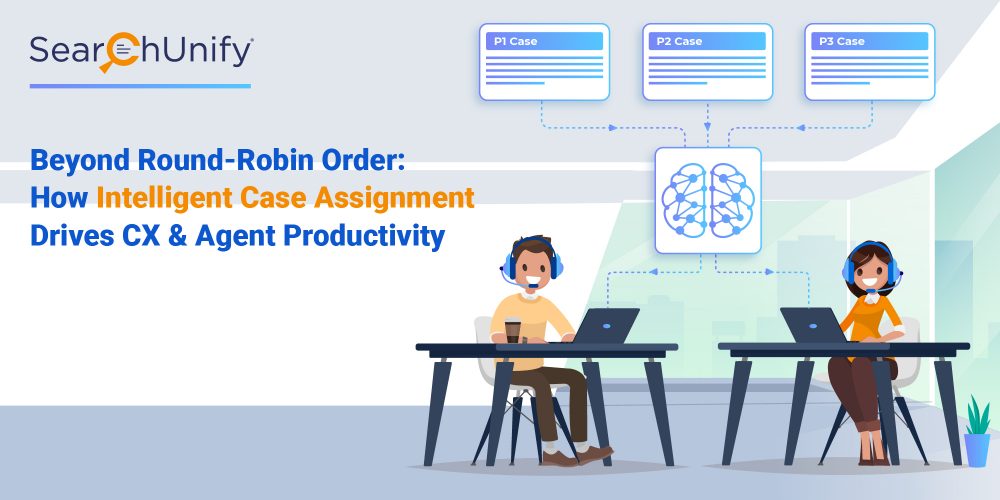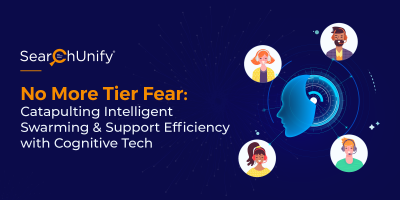
When it comes to building a business, attracting new customers is only half the battle. Success hinges on how satisfied your current customers are with your products or services, now more than ever. One of the most important attributes of good customer service is how quickly you can resolve their issues.
Bold360’s research opines, ‘43% of customers say getting a resolution from the first person they contact is what it takes to make them happy.’
Therefore, putting customers in a queue while they wait for the next available agent is asking them to play time-consuming routing roulette—a gamble that could go wrong. The solution? An intelligent routing system that facilitates effective triaging of tickets after matching customer intent with agents’ skills and proficiency.
This ensures that the case goes to the team or agent that is best equipped to handle the concern in the first attempt. This blog post explains why intelligent case routing is worth the hype and why you need it to expedite your support processes.

How Does Intelligent Case Assignment Work?
Several AI-based solutions allow easy capture of customer data from various digital channels. These platforms are powered by Natural Language Processing (NLP) and Machine Learning (ML) that analyze customer sentiments by examining things like comments or conversations, elapsed time, etc., in the ticket to predict the chances of case escalation.
Next up, the platform utilizes the available CRM data and old cases to get a glimpse of agent expertise i.e., what kind of issues an agent has resolved. This helps the underlying insights engine to prioritize urgent cases and tag them under the right categories so that your best agent is on it.
What distinguishes intelligent routing from simple round-robin systems is that it assigns the cases to the ‘best available’ agents. On the contrary, round-robin scheduling assigns the tickets/cases to the ‘next available’ agents irrespective of whether they are the best fit to solve the query or not.
Advanced platforms offer intelligent case assignment that requires minimal human supervision and training. It continuously improves over time using the agent feedback. This process of orchestrating customer queries with appropriate agents lowers call durations and increases customer satisfaction.

Benefits of Intelligent Case Assignment
1. Reduces Average Handle Time (AHT)
The primary goal of intelligent routing is to provide the incoming communication to the most appropriate agent. Since the ticket is handled by the best available representative, the number of case transfers and customer hold durations also dip, consequently reducing ticket average handle time.
According to NewVoice Media, ‘Consumers will wait on hold for an average of 11 minutes before hanging up.’
2. Facilitates Root Cause Analysis
Smart routing not only helps to resolve issues on a case-to-case basis but also identifies the root cause of escalations, thus curbing future escalations. Some advanced solutions give the agents a comprehensive view of the problematic areas along with possible solutions for them to nip the problem in the bud.
Effective interpretation of the collected data is critical to the success of intelligent case assignments.
3. Personalizes User Experience
Providing frictionless customer support by routing the issues to the optimal agents right off the bat not only enhances CX significantly but also personalizes it. Intelligent case assignment leverages AI and NLP techniques and rummages historical data to find customer details. This gives the agents insight into what the customers are looking for, even before the interaction.
Research carried out by Gartner indicates “in a few years from now, 89 percent of businesses will compete mostly on customer experience.”
4. Propels Proactive Support
Having an intelligent case assignment system allows you to take preemptive measures for cases that can likely be escalated simply by routing critical ones to an expert agent. Additionally, implementing intelligent triaging results in proactively resolving tickets within a stipulated time frame. Thus, eliminating the chance of SLA breaches.
5. Elevates Customer Experience
Every customer expects a quick, accurate, and effective redressal of their issues, performed by an experienced agent who understands the problem and handles the situation empathetically. Whether this expectation will turn into reality has a lot to do with how it’s initially routed. Under the classic round-robin system, when the first representative fails to resolve the issue, the customer’s ticket is transferred around like a hot potato until it falls into the lap of the right agent. Intelligent case assignment automatically assigns inbound customer tickets to the most suitable agent right off the bat.
6. Improves Agent Productivity
Support agents face an uphill battle when they don’t have adequate knowledge or required expertise to solve a case. Not only will it take more time to resolve, but there are high chances of the case getting escalated. A hit to both your customer experience as well as agent morale. This is where intelligent case routing steps in and amps up your support game. Planned routing ensures that when a new ticket comes in, it is automatically sent to the most appropriate agent. Consequently, every agent will have a balanced queue, in addition to increased efficiency.
Need Tools to Streamline Your Support System?
If your organization’s routing system is still running by the old ways, then it’s time you reconsider your approach to make it more proactive and smartly planned. Not sure how? SearchUnify’s Escalation Predictor turbocharges your organization’s support ecosystem to enhance agent productivity while elevating the user experience, all at the same time. If you want to dive deeper into what SearchUnify’s AI-powered platform can do to amplify agent productivity, request a live demo today!
















